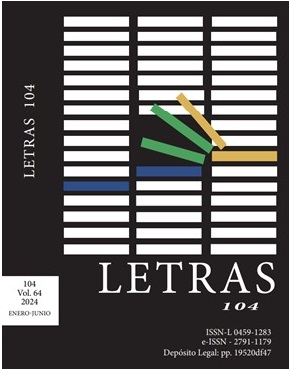Circular Narratives in Allah N'est Pas Obligé (Allah Is Not Obliged) by Ahmadou Kourouma
DOI:
https://doi.org/10.56219/letras.v64i104.3033Keywords:
circular narratives, imaginary and symbolism, Ahmadou Kourouma, francophone Africa.Abstract
This paper aims to study the functioning of circular narratives in Ahmadou Kourouma's Allah n'est pas obligé and to analyze the imaginaries and symbolisms that converge in its aesthetics. We will use a narratological approach to examine the structures of the narrative and a hermeneutic approach to interpret the meaning of the circularity of the story; we will study the interrelations with other works and the forms taken by the figures of repetition, which the author uses with a picaresque air, humor, and dirty terror to express a world view in which different cultures and cosmogonies converge: Caffé, Mandingo, Muslim and European imaginaries. Through the voice of a child soldier, the author testifies to the socio-political problems of West Africa in the context of "tribal wars". Our interpretations seek to open up spaces to bring new meanings to this work from francophone Africa.
Downloads
References
Akrobou, E. (2015). La imagen del héroe negroafricano en la narrativa de Kourouma Ahmadou, hacia una dimensión picaresca: caso de Allah n’est pas obligé y Les soleils des indépendances. Nodus sciendi, 13, pp. 1-16.
Baquero-Goyanes, M. (1972). La estructura de la novela actual. Editorial Planeta.
Bazié, I. (2003). "Écritures de violence et contraintes de la réception : Allah n’est pas obligé dans les critiques journalistiques française et québécoise". Présence Francophone : Revue internationale de langue et de littérature, 61(1), article 8. https://crossworks.holycross.edu/pf/vol61/iss1/8
Blake, W. [1793] (2007). El matrimonio del cielo y el infierno. Trad. Xavier Villarrutia. Renacimiento.
Boudreault, L. (2006). L’œuvre romanesque d'Ahmadou Kourouma et sa critique. https://corpus.ulaval.ca/jspui/bitstream/20.500.11794/18560/1/23990.pdf
Brooks, M. (1981). La loca historia del mundo. 20th Century Fox.
Cendrars, B. (2007). Antología negra (mitos, leyendas y cuentos africanos. El perro y la rana.
Corcoran, P. (2018). « Le « devenir auctorial » d’Ahmadou Kourouma ». Consulté le 31 mai 2019. http://journals.openedition.org/coma/1158. DOI: https://doi.org/10.4000/coma.1158
Coulibali, A. (2009). Allah n’est pas obligé, ou la parole injurieuse. En Researchgate. https://www.researchgate.net/publication/260471698_Allah_n%27est_pas_oblige_ou_La_Parole_injurieuse
Durand, G. (2004). Las estructuras antropológicas del imaginario. Introducción a la arquitepología general. Fondo de cultura económica.
Frankétienne (1993). L’oiseau schizophone. Éd. des Antilles.
Frankétienne (2004). Entrevista a Frankétienne, por Touambona. « Écrire » Frankétienne. https://courier.unesco.org/es/articles/franketienne-la-creacion-es-una-odisea-sin-escalas
Genette, G. (1972). Figures III. Éditions du Seuil.
Genette, G. (1982). Palimpsestes. Éditions du Seuil.
Hall, A. (2004). La Quête du "Centre" et quelques archétypes féminoïdes dans Allah n'est pas obligé d'Ahmadou Kourouma. Consultado el 22 de junio de 2019. https://online.liverpooluniversitypress.co.uk/doi/abs/10.3828/AJFS.41.1.16?mobileUi=0& DOI: https://doi.org/10.3828/AJFS.41.1.16
Kourouma, A. (2000). Allah n’est pas obligé. Éditions du Seuil. DOI: https://doi.org/10.3917/polaf.080.0079
Kourouma, A. (2001). Ala no está obligado. Traducción de Daniel Alcoba, Muchnick editores. https://tweet.monster/books/es/xyz/16/Ala-no-esta-obligado-Ahmadou-Kourouma.pdf
Lassi, É-M. (2000). KOUROUMA, Ahmadou, Allah n’est pas obligé, Paris, Éditions du Seuil, 2000. Université de Calgary. https://www.erudit.org/fr/revues/etudlitt/2003-v35-n1-etudlitt752/008637ar/ DOI: https://doi.org/10.7202/008637ar
Mairy, F. (2002). Le blablabla de la guerre. https://www.avoir-alire.com/allah-n-est-pas-oblige-ahmadou-kourouma
Messay, M. (2014). Unlocking the voices of child soldiers in sub-saharan african novels, films and autobiographies. A Dissertation submitted to the Department of Modern Languages and Linguistics in partial fulfillment of the requirements for the degree of Doctor of Philosophy Degree Awarded: Florida State University College of Arts and Sciences. https://diginole.lib.fsu.edu/islandora/object/fsu:253576/datastream/PDF/view
Mouralis B. (2004). Ahmadou Kourouma (1927-2003) ou l’innovateur. En Africulture. http://africultures.com/ahmadou-kourouma-1927-2003-ou-linnovateur-3335/ DOI: https://doi.org/10.3917/afcul.059.0122
Nascimento, F. (2011). Allah n’est pas obligé d’Ahmadou Kourouma: une allégorie de l’écrivain-témoin. Université d’État de Sâo Paulo «Julio Mesquita». https://books.openedition.org/pur/39272?lang=es DOI: https://doi.org/10.4000/books.pur.39272
Ndiaye, C. (2007). La mémoire discursive dans Allah n’est pas obligé ou la poétique de l’explication du « blablabla » de Birahima. Études françaises, 42(3), 77–96. https://www.erudit.org/fr/revues/etudfr/2006-v42-n3-etudfr1618/015791ar/ DOI: https://doi.org/10.7202/015791ar
Nimrod (2004). Du proverbe au verbe : la nouvelle philosophie des vocables chez Kourouma. En Revue des littératures du sud. II Confluences. N° 155-156. Identité littéraire juillet-décembre.
Rimbaud, A. (1998). Una temporada en el infierno, Las iluminaciones. Edición bilingüe. Monte Ávila editores.
Roy, N. (2004). Chaos temporel et chaos romanesque dans Allah n'est pas obligé d'Ahmadou Kourouma. Université du Québec. Présence Francophone: Revue internationale de langue et de littérature. https://crossworks.holycross.edu/pf/vol63/iss1/9
Sackey, D.E. (2012). Esthétique et éthique du témoignage dans le nouveau roman africain d’expression française : Emmanuel Dongala, Tierno Monénembo et Ahmadou Kourouma. Thèse présentée au Département d’Études Françaises en vue de l’obtention du grade de Docteur en Philosophie Queen’s University Kingston. https://qspace.library.queensu.ca/bitstream/handle/1974/7026/?sequence=3
Seuil (2000). Allah n’est pas obligé d’Ahmadou Kourouma. https://www.seuil.com/ouvrage/allah-n-est-pas-oblige-ahmadou-kourouma/9782020427876
Seuil (2022). En attendant le vote des bêtes sauvages d’Ahmadou Kourouma. [Texto en línea] https://www.seuil.com/ouvrage/en-attendant-le-vote-des-betes-sauvages-ahmadou-kourouma/9782020331425
Published
How to Cite
Issue
Section
License
Copyright (c) 2024 LETRAS

This work is licensed under a Creative Commons Attribution-NonCommercial-ShareAlike 4.0 International License.
Letras magazine retains the patrimonial rights (copyright) of the published works, which favors and allows their reuse under the license (CC BY - NC - SA 4.0), for which they can be copied, used, disseminated, transmitted and expose publicly, as long as the authorship and original source of its publication (magazine, publisher, URL and DOI of the work) is cited, they are not used for commercial or onerous purposes and the existence and specifications of this use license are mentioned.















